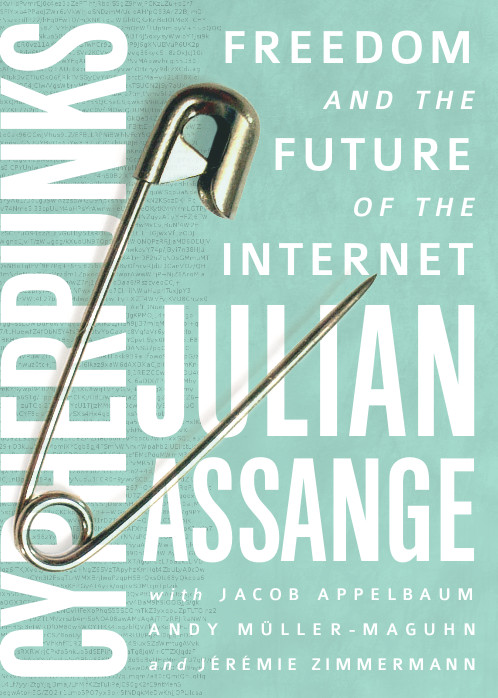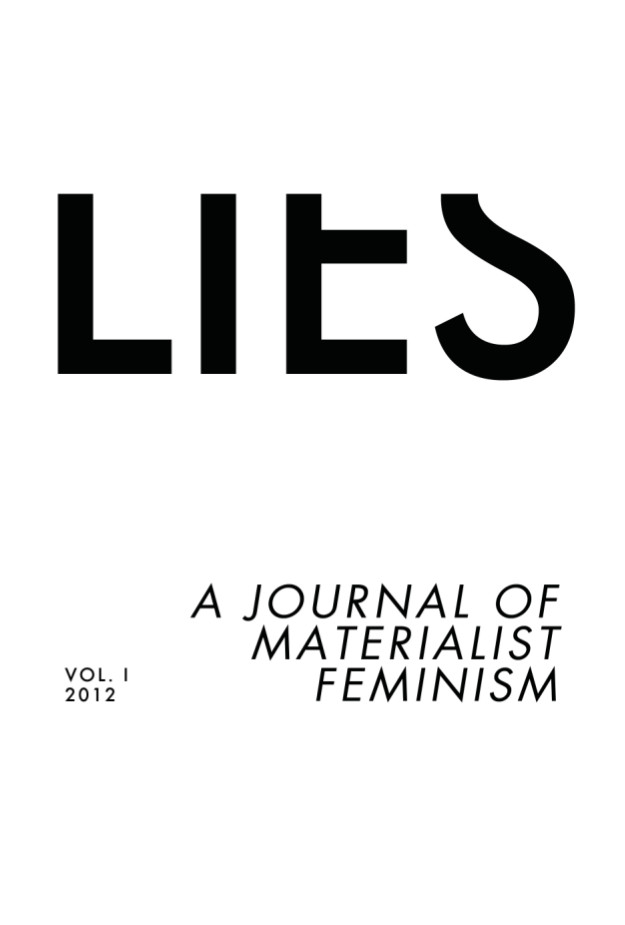Julian Assange, et al.: Cypherpunks: Freedom and the Future of the Internet (2012)
Filed under book | Tags: · activism, anonymity, censorship, code, cryptography, cypherpunk, encryption, free software, hacking, internet, internet activism, politics, privacy, software, surveillance, transparency, wikileaks

Cypherpunks are activists who advocate the widespread use of strong cryptography (writing in code) as a route to progressive change. Julian Assange, the editor-in-chief of and visionary behind WikiLeaks, has been a leading voice in the cypherpunk movement since its inception in the 1980s.
Now, in what is sure to be a wave-making new book, Assange brings together a small group of cutting-edge thinkers and activists from the front line of the battle for cyber-space to discuss whether electronic communications will emancipate or enslave us. Among the topics addressed are: Do Facebook and Google constitute “the greatest surveillance machine that ever existed,” perpetually tracking our location, our contacts and our lives? Far from being victims of that surveillance, are most of us willing collaborators? Are there legitimate forms of surveillance, for instance in relation to the “Four Horsemen of the Infopocalypse” (money laundering, drugs, terrorism and pornography)? And do we have the ability, through conscious action and technological savvy, to resist this tide and secure a world where freedom is something which the Internet helps bring about?
The harassment of WikiLeaks and other Internet activists, together with attempts to introduce anti-file sharing legislation such as SOPA and ACTA, indicate that the politics of the Internet have reached a crossroads. In one direction lies a future that guarantees, in the watchwords of the cypherpunks, “privacy for the weak and transparency for the powerful”; in the other lies an Internet that allows government and large corporations to discover ever more about internet users while hiding their own activities. Assange and his co-discussants unpick the complex issues surrounding this crucial choice with clarity and engaging enthusiasm.
With Jacob Appelbaum, Andy Müller-Maguhn, and Jérémie Zimmermann
Publisher OR Books, New York/London, November 2012
ISBN 9781939293008
192 pages
Interview with Assange where he also speaks about the book (video, DemocracyNow!, 29 November 2012)
Commentary (The Guardian)
Review (Cryptome.org)
PDF (PDF)
PDF (EPUB)
PDF (MOBI)
PDF (torrent, all 3 formats)
Video of Assange’s TV show The World Tomorrow interview the book is based on, Part 1, Part 2 (Youtube.com)
Lies: A Journal of Materialist Feminism, No. 1 (2012)
Filed under journal | Tags: · communism, feminism, marxism, materialism, politics, queer theory, sex, theory, women

“LIES is a new journal spearheaded by a feminist collective based in Oakland, Baltimore, Los Angeles and New York City.
LIES is a communist journal against communists.
LIES is a platform for certain conversations and critiques that are difficult, impossible or dangerous if cis men are in the room.
LIES attacks the legacy of racism and transphobia that has plagued feminist organizing and strives to develop new ways of making autonomous feminist practices today that take pointed and militant attacks on white supremacy and transphobia as essential parts of feminist struggle.
LIES came out of our experience within struggles. It seeks to embody and develop in print the practice of autonomy that we needed to save ourselves in the midst of movements squared on patriarchy and fueled by the subordination of everyone but white cis men.
LIES draws its purpose and support from networks and circles of feminist, queer, and trans people, our friends and comrades to whom this journal is devoted.”
Creative Commons Attribution-Noncommercial License
250 pages
Carl Freedman: The Age of Nixon: A Study in Cultural Power (2012)
Filed under book | Tags: · history, liberalism, marxism, politics, psychoanalysis, united states

Applies Marxism and psychoanalysis to the study of American politics. In America, every age is the Age of Nixon.
The fundamental argument of this book is, first, that Richard Nixon, though not generally regarded as a charismatic or emotionally outgoing politician like Franklin Roosevelt or Ronald Reagan, did establish profound psychic connections with the American people, connections that can be detected both in the brilliant electoral success that he enjoyed for most of his career and in his ultimate defeat during the Watergate scandal; and, second and even more important, that these connections are symptomatic of many of the most important currents in American life. The book is not just a work of political history or political biography but a study of cultural power: that is, a study in the ways that culture shapes our politics and frames our sense of possibilities and values. In its application of Marxist, psychoanalytic, and other theoretical tools to the study of American electoral politics, and in a way designed for the general as well as for the academic reader, it is a new kind of book.
Publisher Zero Books, an imprint of John Hunt Publishing, 2012
ISBN 1846949432, 9781846949432
295 pages
commentary (Steven Shaviro)
PDF (EPUB)
Comment (0)
